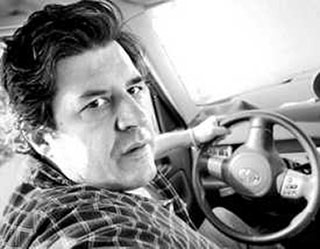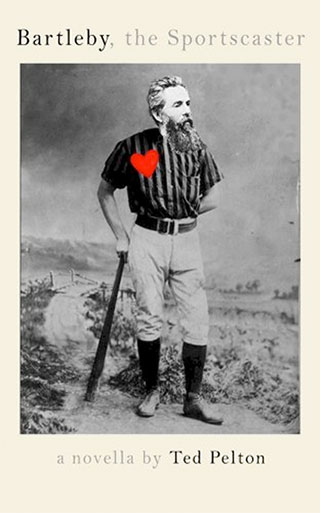Surprising as Life Itself
by Michael Koh


Author Ted Pelton reads at Hallwalls' Exhibit X series
Ted Pelton has authored four works of fiction: Bhang, Endorsed by Jack Chapeau 2, Malcolm & Jack (and Other Famous American Criminals), and Bartleby, the Sportscaster. A professor of English at Medaille College and coordinator of the school’s creative writing program, he is also the founder of Starcherone Books, an independent, nonprofit publisher that has published more than 20 books. Pelton will be reading at Hallwalls on Tuesday, November 16 at 7pm, as part of the Exhibit X reading series.
AV: Do you think that Buffalo has a strong literary community?
Pelton: Buffalo’s literary community is truly a beautiful thing. The literary community here predates any of the people who are currently involved in it. Many people who read and write poetry and all manner of other things in Buffalo were students of those who are now gone—Robert Creeley, Raymond Federman, John Logan, Jack Clarke. There’s a legacy to honor, and even people new to Buffalo get in the spirit of it…I think that you can’t attend a Just Buffalo Big Night or readings at Rust Belt Books or the long-running series at Canisius or Medaille without seeing that Buffalo has something very unique and powerful going on when it comes to literary audience. Buffalo is a truly great place to be a writer.
AV: From what I understand, Malcolm & Jack is a contemporary critique of our social culture, much like what the Beat writers—Kerouac, Burroughs, Ginsberg, Corso—attempted to do.
Pelton: A major theme of Malcolm & Jack is that criminality is defined arbitrarily; in this particularly instance, two figures who were criminals on the fringes of society in the 1940s, Malcolm X and Jack Kerouac, became important figures of dissent in the 1960s. My book takes place in the 1940s, and is an anti-war book, or at least I think of it that way. And pacifism is a very definite legacy of the Beats; even Kerouac, whose politics were otherwise kind of confused, had a deep, lifelong pacifism. He just didn’t think he had any right to kill someone else…
I think Buffalo in a lot of its characteristics embodies that live and let live vibe of the Beats. The City of Good Neighbors, right?
AV: Where do you find inspiration to write stories such as Bhang and Woodchuck and Hank Williams Zombie?
Pelton: I think art has a duty to be different, to be as alive and surprising as life itself, and to not just imitate but, as poet Charles Olson said, to enact life. I think writing or any art to be successful has to startle and perhaps be weird or odd or “foreign” at first. I seek this quality out in my own writing and I seek to cultivate it. Not that I don’t want to be understood; quite the contrary. I am at great pains to make things plain while at the same time fitting my vision of how my work should present itself.
AV: Your most recent work, Bartleby, the Sportscaster, is a postmodern allegory on Herman Melville’s Bartleby, the Scrivener. Would you like to give us a little background on the novella?
Pelton: When I was young, I felt that Bartleby was a victim of the capitalist system that didn’t allow him room for self-expression. But as I’ve gotten older, I’ve started to have sympathy for the lawyer. What could he, personally, do for Bartleby? He tries everything. He offers to send him to Europe. He offers to have Bartleby move in with him. The lawyer seems just as lonely himself as Bartleby is. He’s successful, and economically comfortable, but he’s just one other human being. But you can’t save someone else unless they want to be saved—that’s the lesson here. Well, one lesson anyway, because a great work will have you see it in different ways at different moments of your life. I don’t think my earlier reading of Bartleby, the story, was wrong—it just came from a different place.
AV: You’re reading at Hallwalls on November 16 as part of the Exhibit X series. Have you collaborated with any of the authors that are participating in the series?
Pelton: I have worked with Davis Schneiderman and published, for instance, Lydia Davis, who was in the series a couple years ago—among several others. It’s a really superb component of Buffalo’s literary scene. It’s also nice to be doing something for UB, where I got my Ph.D many years ago and where they often have a kind of short memory about their grads who become part of the Buffalo community. There is a part of UB that wants never to be associated with the unclean masses of the city of Buffalo, and that stays out in their antiseptic Amherst. If I can help it, I try to leave the Buffalo city environs as little as possible.
AV: Do you think that the age of fiction is dying?
Pelton: I think all narrative writing partakes of the techniques of fiction. People select out of the things that have happened to them parts that make up a story; they embellish, they perspectivize, they misremember, they fall into illusions about their own and others’ behavior…I think the idea of a “creative nonfiction” is a bit ridiculous…It’s an attempt to take the instability of language out of the equation, and it insults both language and lived experience.
AV: So do you think experimental fiction is making a comeback?
Pelton: ”Experimental” writing, or innovative fiction, acknowledges the role of language in creating the thing you are reading, or viewing, or receiving, however it comes to you…Awareness of the roles of language in shaping how we understand the world makes us more aware of the workings of power and how stories are used and can end by using us. To give one example that I explored in Malcolm & Jack: The American 1940s are largely understood via the myth of America’s “Greatest Generation,” and as a result of that national tale, the US tends to get behind war as a positive solution to problems…The 1940s, just like our own time, were a complicated moment. America’s “Greatest Generation” also were far more institutionally racist and sexist, and less likely to act in self-examining ways than I hope we are today.
AV: If you could say anything to future writers, what would you tell them?
Pelton: Don’t do it if you think you can make money this way. Expect to serve a long apprenticeship. Do it only if you love it.
—michael koh
blog comments powered by Disqus
|
Issue Navigation> Issue Index > v9n45 (week of Thursday, November 11) > Surprising as Life Itself This Week's Issue • Artvoice Daily • Artvoice TV • Events Calendar • Classifieds |









 Current Issue
Current Issue